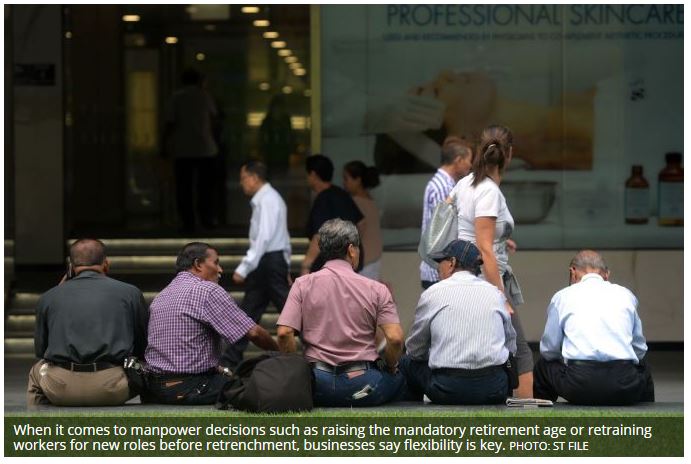Singapore: Retirement age review, reskilling: Firms say flexibility is key
WHEN it comes to manpower decisions such as raising the mandatory retirement age or retraining workers for new roles before retrenchment, businesses say flexibility is key.
This viewpoint arose in response to news of the upcoming review of whether changes are needed on the statutory retirement age at 62 and re-employment age extending to age 67. It will also evaluate the impact of the Central Provident Fund contribution rates on retirement adequacy for older workers.
Last week, labour chief Ng Chee Meng urged employers to voluntarily raise the retirement age of their workers beyond 62.
Some employers who spoke to The Business Times expressed concern that any legislation – such as increasing the retirement age – could lead to added business costs and greater inefficiencies.
Toby Koh, group managing director of Ademco Security Group, said: “The government should come up with a scheme to reskill these older workers so that they are retrained and valuable. So from a rational point of view, companies would still want to hire them instead of having it forced upon them.
“Making it mandatory is not very healthy for businesses as a whole.”
However, with the talent crunch faced by small and medium-sized enterprises (SMEs), a possible rise in the retirement age could even benefit them.
Most SMEs currently have no hard and fast rules about retirement; some long-time staff carry on in their roles until they decide to retire.
Sonny Bensily, founder and managing director of Prime Structures, said his company has no fixed retirement age.
“After the age of 62, the decision is based on mutual consent,” he said. “But construction can be very tough with long hours, so it might be difficult for older workers.”
With the construction sector’s struggle to secure talent, he thinks raising the retirement age could help ease the labour shortage.
John Cheng, business development director of Cheng Yew Heng Candy Factory, said many of the company’s older workers choose to stay on – sometimes well into their 70s.
“It’s a family business, so if they don’t wish to retire, it’s really up to them. We look at performance and capability, not age,” he said.
Winnie Chan, founder and chief executive of Bynd Artisan pointed out that there is no one-size-fits-all when it comes to retirement or re-employment age.
“It also depends on the health of each person. A person should be able to have the choice to decide if they wish to continue working or to retire,” she said.
But she expressed concern about a possible hike in employer CPF contribution rates. “CPF contributions are already quite a significant cost for employers. I understand that cost of living has risen and will continue to rise, but perhaps the solution should not be entirely borne by employers,” she suggested.
Aside from the review of the retirement age, Manpower Minister Josephine Teo said in a recent interview that companies should ideally retrain workers to take on new roles in the firm before they get retrenched.
SMEs agree that workers need to be reskilled, but question how this would be enforced.
Mr Koh said: “It’s really about the mindset of management. In my company, we have life-long employment. But we do know that in other companies, they wouldn’t bother to retrain the workers, because it’s not efficient.
“How are you going to control it? Should companies spend the time to retrain, or is it cheaper and faster for me to go out and hire the new skillsets?”
He believes that if such a law is enforced, companies will “think twice” about retrenchment.
Mr Cheng said that retraining workers who will be displaced is about being “socially responsible”.
He said that companies should be the ones to retrain sacked staff, rather than have the government foot the bill.
“Typically, SMEs don’t retrench. But in the worst case scenario, the onus is on me to be socially responsible. These workers have been with me for so many years and it is only right that I bear the costs.”
But he pointed out that companies that resort to retrenchments are usually not in a good state: “If your company is not doing well, and you need to spend on retraining, that is an added burden for the company that is already struggling,” he noted.
To allow companies some flexibility, he suggested a public pledge that companies can make to retrain workers, instead of resorting to legislation.
Firms also said that creating stricter labour rules and restrictions could affect whether foreign businesses want to set up shop here.
Ms Chan said: “The challenge is the additional costs involved in a retrenchment exercise – this could result in foreign companies not willing to set up their Asia-Pacific headquarters or offices in Singapore.”
If the laws are “too onerous”, Singapore might lose its attractiveness, concurred Mr Cheng. “In employment, I think you need flexibility as well as guidelines,” he added.
Source: https://www.businesstimes.com.sg/government-economy/retirement-age-review-reskilling-firms-say-flexibility-is-key


 Thailand
Thailand




